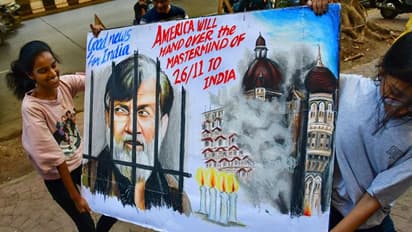'Conspirator' Tahawwur Rana again tries to block extradition to India for 26/11 trial

Synopsis
Rana is facing trial in India for his alleged involvement in the 2008 Mumbai terror attack. The writ of habeas corpus serves as a means to inquire into the reasons and grounds for detention. Rana's attorney urged the court to grant the writ, deny extradition, and order Rana's release.
Tahawwur Rana, a Pakistani-origin Canadian businessman, has filed a writ of habeas corpus challenging a recent United States court order allowing his extradition to India. Rana is facing trial in India for his alleged involvement in the 2008 Mumbai terror attack.
Last month, the US District Court Central District of California approved Rana's extradition. His attorney filed the writ of habeas corpus, arguing that his extradition would violate the United States-India extradition treaty on two grounds.
Law Commission backs sedition law, says Section 124A has utility in combating anti-national elements
First, Rana's attorney claimed that he had already been tried and acquitted in the United States District Court for the Northern District of Illinois for charges related to the same conduct for which India seeks to prosecute him. According to Article 6(1) of the treaty, extradition should not be granted in such cases.
Second, Rana's attorney argued that the evidence submitted by the Indian government, which mainly consists of transcripts and exhibits from Rana's trial in the Northern District of Illinois, does not establish probable cause for the offences he is charged with in India. This fails to satisfy Article 9.3(c) of the treaty.
The writ of habeas corpus serves as a means to inquire into the reasons and grounds for detention. Rana's attorney urged the court to grant the writ, deny extradition, and order Rana's release.
India had filed a complaint for Rana's provisional arrest and extradition in June 2020. The Biden administration supported and approved his extradition to India.
US Magistrate Judge Jacqueline Chooljian, in a 48-page court order dated May 16, reviewed all the submitted documents and arguments before granting the extradition request.
During court hearings, US Government attorneys asserted that Rana was aware of his childhood friend David Coleman Headley's involvement with Lashkar-e-Taiba (LeT), a terrorist organization. They claimed that Rana had supported the organization by assisting Headley and providing cover for his activities.
The US government alleged that Rana was part of the conspiracy and had probable cause to believe he committed terrorist acts. Rana's attorney opposed the extradition request.
Currently, Rana is detained at the Metropolitan Detention Center in Los Angeles. The National Investigation Agency (NIA) of India is investigating his role in the 2008 Mumbai terror attacks carried out by Pakistan-based Lashkar-e-Taiba terrorists.
The NIA has expressed its readiness to initiate proceedings to bring Rana to India through diplomatic channels. The attacks claimed the lives of 166 people, including six Americans, and involved a more than 60-hour siege on iconic and vital locations in Mumbai.
Rahul Gandhi in US: I am first person in India to be given highest punishment in defamation case